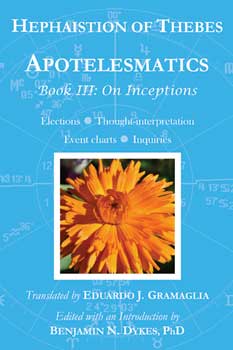 In the 13th episode of the podcast I interview Benjamin Dykes about his new translation of book 3 of the Apotelesmatics of Hephaistio of Thebes.
In the 13th episode of the podcast I interview Benjamin Dykes about his new translation of book 3 of the Apotelesmatics of Hephaistio of Thebes.
Hephaistio was a 5th century astrologer who wrote in Greek, and his third book contains some of the earliest material on electional astrology, largely derived from the 1st century astrologer Dorotheus of Sidon.
This is the first time that this text has ever been fully translated into any modern language. The translation was carried out by Eduardo Gramaglia, and Ben served as editor and publisher of the text through his company The Cazimi Press.
This is an exciting publication because it allows us to finally answer some longstanding questions about the history and origins of horary astrology, and the extent to which it was practiced in the Hellenistic tradition.
The book can be ordered through the link to the page below:
Hephaistion of Thebes’ Apotelesmatics: Book III: On Inceptions
Below you will find the show notes, which outline some of the different topics that we discussed during the course of the interview.
Outline of the Episode: Interview with Benjamin Dykes
- Who is Hephaistio of Thebes?
- Is it “Hephaistio” or “Hephaistion”?
- What is the significance of the book?
- Largely on electional astrology.
- Preserves material from Dorotheus, who is the earliest source on elections.
- Better version of the Dorotheus material than what we had in the Arabic version.
- Talking about the process of making the transition.
- About Eduardo Gramaglia, the translator.
- Ben’s role in editing the book.
- One of the reasons the book is important is due to the horary issue.
- Does the book contain horary astrology?
- The controversy surrounding the origins of horary.
- My realization that there is definitely one clear reference to horary in the text, which changes my understanding of the history and development of horary.
- Manuscript variations and discussion of that argument.
- Distinction between thought-interpretation, predicting outcomes, event charts, and horary questions.
- Is it valid to distinguish between consultation charts and horary?
- A number of appendices.
- Appendix D includes all existing Greek excerpts from book 3 of Dorotheus.
- This goes a long way towards allowing us to fully reconstruct Dorotheus.
- Technical emphasis on the four angles in almost every election, rather than on individual houses.
- Some of the material derived from an earlier strata of the tradition?
- Future projects that Ben and Eduardo are planning.
Transcript
A full transcript of this episode is available: Episode 13 transcript
Download or Stream the Podcast
You can either download this episode of the show as an MP3 or you can play it directly from the website by using the buttons below:
Podcast: Play in new window | Download (Duration: 1:08:16 — 31.4MB)


A bit dry but absolutely necessary. Looking forward to checking out Dykes’ work in a few years. Thank you for the arduous work.